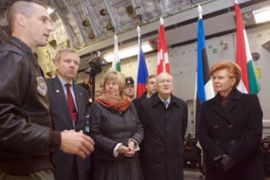Afghanistan to dominate Nato agenda
Nato leaders meeting in Latvia to be urged to commit to the mission in Afghanistan.

“Our exit strategy will depend on Afghanistan having its own security forces,” he said, adding that Nato would launch a training programme for the Afghan army.
French troops
Chirac, writing in Britain’s Guardian newspaper, said such a group was “necessary to give our forces the means to succeed in their mission in support of the Afghan authorities, and refocus the alliance on military operations”.
“The Europeans have relied on their American allies for too long,” Chirac wrote. “They have to shoulder their share of the burden by making a national defence effort commensurate with their ambitions for Nato and also for the EU.”
Scheffer voiced support for Chirac’s plan.
| “We must either go there [Afghanistan], get the job done or say we are unable to deal with it and leave that country to its fate” Vaira Vike-Freiberga, Latvian president |
“We a need a body like the … contact group in Kosovo that brings the key international actors together on a regular basis and coordinates overall strategy.”
Meanwhile, the Financial Times newspaper reported that Chirac will announce that the restrictions that prevent French troops in Afghanistan from entering the fighting in the south are to be loosened.Although all 26 allies have troops in the 32,800-strong force, there have been complaints from Britain, Canada, the US and others in the south that Germany, Italy, Spain and France are keeping their troops in the more peaceful north and west.
Germany’s defence minister, however, has said Berlin will stand by its refusal to expand its military mission in Afghanistan and argued that reconstruction is the key to success in the country.
“The key to success in Afghanistan does not lie in beating down the growing resistance in the south and east with more and more Nato troops,” Franz Josef Jung said in the Frankfurter Allgemeine Zeitung newspaper.
In early September, US General James Jones, Nato’s military commander, called for 2,500 extra military personnel for southern Afghanistan – about 1,000 combat troops supported by 1,500 logistical and other staff – but they have not yet been provided.
Credibility
Dick Lugar, chairman of the US foreign relations committee, said that the failure of member states to commit to Afghanistan could deal a blow to Nato’s credibility.
“If the most prominent alliance in modern history were to fail in its first operation outside of Europe due to a lack of will by its members, the efficacy of Nato and the ability to take joint action against a terrorist threat would be called into question,” he said.
George Bush, the US president, is expected to urge the other leaders to put more military means and funds into the country, saying ordinary Afghans could turn back to the Taliban if reconstruction is too slow.
Leaders in Riga would also discuss the way the alliance is adapting to security threats.
“This summit will prove that Nato is alive and well and adjusting to an ever-changing world,” Vike-Freiberga said.
“The transformation of Nato and its readiness to assume new roles while keeping its ability to collaborate in an enlarged format of 26 members is a challenge in itself that Nato must rise to,” she said.